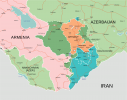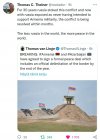Tarkoitin tätä oranssilla värjättyä aluetta mikä on armenialaisten hallussa.Artsakh on ollut koko ajan azerien hallinnassa. Todennäköisesti vaativat maakäytävää sinne, eli siis Armeniaa luovuttamaan osan alueistaan.
Install the app
How to install the app on iOS
Follow along with the video below to see how to install our site as a web app on your home screen.
Note: This feature may not be available in some browsers.
You are using an out of date browser. It may not display this or other websites correctly.
You should upgrade or use an alternative browser.
You should upgrade or use an alternative browser.
Nagorno-Karabakhin tilanne kiristyy jälleen
- Viestiketjun aloittaja Taitolaji
- Aloitus PVM
J0h1F
Respected Leader
Juu, tuli ajatusvirhe näin aamutuimaan. Tosiaankin, vaativat kaiken Azerbaidzaniin kansainvälisoikeudellisesti kuuluvan alueen hallintaa itselleen, ja maakäytävää Nahitsevaniin.Tarkoitin tätä oranssilla värjättyä aluetta mikä on armenialaisten hallussa.
Todennäköisesti aikovat myös tehdä täyden etnisen puhdistuksen koko Vuoristo-Karabahin alueella ja tuon Nahitsevanin-maakäytävän alueella myös.
Kumpikin paha rasti omalta osaltaan. Armenian enklaavista moni jäärä ei suostu elävänä lähtemään mikä varmasti ilahduttaa azereita. Mutta ei tuota aluetta Armenia pysty enää puolustamaan. Kumpikin osapuoli on kyllä verenhimossaan aivan omaa luokkaansa, varmaan jopa israelilaiset ja palestiinalaiset katselevat ihmeissään.Juu, tuli ajatusvirhe näin aamutuimaan. Tosiaankin, vaativat kaiken Azerbaidzaniin kansainvälisoikeudellisesti kuuluvan alueen hallintaa itselleen, ja maakäytävää Nahitsevaniin.
Todennäköisesti aikovat myös tehdä täyden etnisen puhdistuksen koko Vuoristo-Karabahin alueella ja tuon Nahitsevanin-maakäytävän alueella myös.
rty19
Greatest Leader
saftamil
Kenraali
Video jossa azerit teloittaa vangittuja armenialaisia. Täysin kusipäistä touhua.
Viimeksi muokattu:
Joku suomalainen keskustelussa.Katso liite: 68304
Semmoset setit Armenialaiselta sitten. Mun sympatiat meni samantien. Ryssän propagandalla kyllästetty apina oli hän. Jos oli Azeritrolli, niin oikein toimiva kyllä, täytyy myöntää.
Santala
Luutnantti
Olisko minä?Joku suomalainen keskustelussa.

Santala
Luutnantti
"The office of the Human Rights Defender of Armenia confirmed the authenticity of the recording."Video jossa azerit teloittaa vangittuja armenialaisia. Täysin kusipäistä touhua.
Antares
Respected Leader
ddude
Eversti
Neuvotteluita käyty rauhasta ja päästy sopimukseenkin?
Leaderwolf
Respected Leader
Ählämit vauhdissa, sulttaanin tukemana"The office of the Human Rights Defender of Armenia confirmed the authenticity of the recording."
 Ja ryssä jonka piti suojella pientä Armeniaa, käy mieluummin valloitussotaa.
Ja ryssä jonka piti suojella pientä Armeniaa, käy mieluummin valloitussotaa.J0h1F
Respected Leader
Saa nähdä kuinka pahasti Armeniaa hoonataan tuossa, sillä tosiaankin maiden SNT:jen rajoista periytyvää de facto rajalinjaa (ei siis Artsahin ja Azerbaidzanin aselepolinjaa) ei ole ikinä Neuvostoliiton hajoamisen jälkeen määritetty de jure tai merkitty maastoon. Toivottavasti demarkaatiota ohjaa jokin kolmas taho, esim. juuri Ranska, joka rauhaa oli hieromassa; armenialaisia nyt vedetään kuivana ihan riittävästi muutenkin, kun heidät todennäköisesti ajetaan koko Artsahista maanpakoon.
Ja toivottavasti Armenia saa ranskalaisia joukkoja maahansa ja heittää ryssän pois maasta ("kun Venäjä kuitenkin tarvitsee sotilaitaan muualla") ja alkaa Ranskan tuella rakentaa uudelleen armeijaansa. Tuolla voisi Suomikin sitten Ranskan tukena olla, kun meillä on jo moderni panttikomppania muutenkin Ranskaa tukemassa Libanonissa - voisimme osoittaa solidaarisuutta Ranskalle näinkin, kun Malin osalta hommat menivät pieleen. Ja uudelle lännen liittolaiselle asevelvollisuusarmeijoineen voisi sotilaskoulutuksessakin apua antaa, jos ryssän häätäminen tuolta siis onnistuu.
J0h1F
Respected Leader
Onkohan tuossa taustalla se, että Iran pyrkii siirtämään sisäisen konfliktin ulkoiseksi ja saamaan rivit kuntoon sillä? Iranin ongelma toki on se, että se ei ole ikinä ollut kunnolla persialaisten kansallisvaltio, ei etenkään islamilaisen vallankumouksen jälkeen, ja erityisesti pohjoisessa on azerialueita paljonkin (ja toisaalta Tadžikistan ja Afganistanin darialueet ovat ihan täysin persialaisalueita, jotka kansallisaatteen näkökulmasta oikeutetusti kuuluisivat osaksi Persiaa, ja ovat vain imperialismin ajan takia irrallaan Persiasta), enkä olisi laikaan varma, ettäkö tuo on heiltä viisas veto, sillä vain lietsoo azerien kapinahenkeä Iranissa. Armeniaa se ainakin saattaa hetkellisesti auttaa, ja se voi olla myös Moskovan toive, jotta Armenia ei lipuisi kokonaan esim. Ranskan taskuun, kun Venäjästä ei ole apua ollut (jos Venäjä ja Iran eivät tukisi Armeniaa, niin niiden liittolaisena oleminenhan olisi Armenialle täysin hyödytöntä ja Armenian kannattaisi muuttaa strategiaansa ja siirtyä lännen liittolaiseksi).
Toisaalta, jos tämä taipuukin azerit vs. persialaiset -konfliktiksi, niin varmasti Iranin persialaisväestö siirtyy huononkin hallintonsa tueksi ja konflikti saanee aika raamatulliset raamit kansanmurhineen, näin @Bwana erinomaista ilmausta mukaillen (jota hän käytti Etiopian sisällissodasta, kuinka siellä on todellakin Vanhassa Testamentissa kuvatut sodankäynnin tavat yhä voimissaan). Kurdit ovatkin sitten epämääräisempi kysymys, mutta kurdeillakaan ei ole hirveästi sympatioita turkkilaiskansoja (turkkilaiset ja azerit) kohtaan.
Viimeksi muokattu:
Onkohan tuossa taustalla se, että Iran pyrkii siirtämään sisäisen konfliktin ulkoiseksi ja saamaan rivit kuntoon sillä? Iranin ongelma toki on se, että se ei ole ikinä ollut kunnolla persialaisten kansallisvaltio, ei etenkään islamilaisen vallankumouksen jälkeen, ja erityisesti pohjoisessa on azerialueita paljonkin (ja toisaalta Tadžikistan ja Afganistanin darialueet ovat ihan täysin persialaisalueita, jotka kansallisaatteen näkökulmasta oikeutetusti kuuluisivat osaksi Persiaa, ja ovat vain imperialismin ajan takia irrallaan Persiasta), enkä olisi laikaan varma, ettäkö tuo on heiltä viisas veto, sillä vain lietsoo azerien kapinahenkeä Iranissa. Armeniaa se ainakin saattaa hetkellisesti auttaa, ja se voi olla myös Moskovan toive, jotta Armenia ei lipuisi kokonaan esim. Ranskan taskuun, kun Venäjästä ei ole apua ollut (jos Venäjä ja Iran eivät tukisi Armeniaa, niin niiden liittolaisena oleminenhan olisi Armenialle täysin hyödytöntä ja Armenian kannattaisi muuttaa strategiaansa ja siirtyä lännen liittolaiseksi).
Toisaalta, jos tämä taipuukin azerit vs. persialaiset -konfliktiksi, niin varmasti Iranin persialaisväestö siirtyy huononkin hallintonsa tueksi ja konflikti saanee aika raamatulliset raamit kansanmurhineen, näin @Bwana erinomaista ilmausta mukaillen (jota hän käytti Etiopian sisällissodasta, kuinka siellä on todellakin Vanhassa Testamentissa kuvatut sodankäynnin tavat yhä voimissaan). Kurdit ovatkin sitten epämääräisempi kysymys, mutta kurdeillakaan ei ole hirveästi sympatioita turkkilaiskansoja (turkkilaiset ja azerit) kohtaan.
Kiitos laajasta viestistä. Todella mielenkiintoista nähdä, että mitä tuolla vielä tapahtuu.
Tämä oli uusi juttu, että Armenia voisi siirtyä Ranskan kanssa yhteistyöhön - miksi juuri Ranska?
J0h1F
Respected Leader
Tuo on toki vain omaa ajatteluani, mutta Ranskalla on historiallisista syistä vahvat sympatiat armenialaisia kohtaan. Taustalla on Ranskan ja Turkin/Ottomaanien jo 1800-luvusta lähtien jatkuneet huonot välit (kiistat alkoivat Napoleonista ja kärjistyivät imperialismin aikakaudella, ja välit menivät lopullisesti I maailmansodassa, kun Ottomaanien valtakunta oli keskusvaltojen puolella), erityisesti Turkin kansallisvaltion koko olemassaolon ajan jo, ranskalaisten historiallinen kristittyjen väestöryhmien suojelu (mm. Libanon oli Ranskan yritys kristityn valtion luomiseksi Lähi-itään) ja Ranskan suuri armenialaisvähemmistö. Kuten ylläTämä oli uusi juttu, että Armenia voisi siirtyä Ranskan kanssa yhteistyöhön - miksi juuri Ranska?
huomaammekin, nimenomaan Ranska oli Armenian ja Azerbaidžanin välisiä rauhanneuvotteluja jo hieromassa. Ranskalta puuttuu nykyisellään tukeva jalansija Lähi-idän seudulta, Libanonia lukuunottamatta (jossa se on varsin heikko), ja vanhanaikainen suurvalta-ajattelu etupiireineen myös on syvässä ranskalaisessa mentaliteetissa, joten se olisi heille ilman muuta eduksi koettua. Armenialle Ranska olisi helpoin länsimainen liittolainen, sillä se ei tarkoittaisi täyskäännöstä (Ranskalla ei ole USA:n tai Ison-Britannian mainetta; Ranska on Neuvostoliiton Moskovan-mielisessä kulttuuripiirissä jossain määrin ihannoitu ja romantisoitu) armenialaisten ajattelutavassa maailman menosta myöskään (vrt. kuinka suomalaisille EU:n sotilasyhteistyö ja Ranskan avunpyyntöön vastaaminen oli aiemmin ok, mutta NATO-jäsenyydelle tai USA:n kanssa liittoutumiselle ei vielä ollut kannatusta).
Reaalipoliittisessa vaakakupissa Ranskalla varmaankin painaisi se, että Armeniasta voisi saada tukevan ja pitkäaikaisen jalansijan seudulla, ja kaivannaiset varmasti kiinnostavat Armenian kallioperässä. Pidemmällä aikavälillä myös Iranin-Persian suunnan taloudelliset mahdollisuudet selvästi houkuttelevat Ranskaa, kuten on nähty EU:n politiikasta Iranin suhteen.
Viimeksi muokattu:
Antares
Respected Leader
Tässä yhden kirjoittajan mielipide alueen tilanteesta, käännös puolalaisen Defence25.pl sivuston kirjoituksesta (julkaistu 12.10.2022): LÄHDE
WITOLD REPETOWICZ10/12/2022 16:11
The talks between the leaders of Armenia, Azerbaijan and Turkey in the sidelines of the Prague summit of the European Political Community increase the likelihood of the settlement of relations between the three countries. Theoretically, Armenia could free itself from Russian ticks, but the price that Pashinyan will have to pay may lead to a pro-Russian coup. So it all depends on US support.
The photos from the Prague summit show a clear contrast between the cheerful Turkish president Recep Tayyip Erdogan and the president of Azerbaijan Ilham Aliyev, and the gloomy Prime Minister of Armenia Nikol Pashinyan. No wonder, because the task facing the Armenian leader is squaring the circle. On the one hand, it is in Armenia's interest to dismantle Russia's security blackmail, which would allow it to turn to the West. On the other hand, the recognition by Pashinyan of Azerbaijan's sovereignty over Arcach (Nagorno-Karabakh) would lead to a boil in Armenia and, consequently, a pro-Russian coup could not be ruled out. It could also mean the elimination of all traces of Armenianness in Arcach, which would undoubtedly be a historical injustice.
However, the consequences of a possible Armenian-Azerbaijani-Turkish normalization with regard to Arcach are not obvious. A key (though not the only) element of this normalization would be mutual recognition by Armenia and Azerbaijan, probably the establishment of diplomatic relations, and above all the recognition of territorial integrity, border delimitation and the opening of border crossings (including with Turkey). Another aspect is the creation of a connection between Azerbaijan and Nakhichevan and Turkey, which I will write about later.Mutual recognition of territorial integrity refers not only to the sovereignty of Azerbaijan over Arcach, but also to the dissolution of several smaller ethno-administrative enclaves (4 Azerbaijani, i.e. Karki, Sofulu, Yukhari Askipara and Barxudarli in Armenia, and 1 Armenian, i.e. Artsvashen in Azerbaijan) Soviet in the classical complication of the administrative division.During the first stage of the war, i.e. at the beginning of in the 1990s, they were de facto annexed by Armenia and Azerbaijan, respectively, but without any international legal consequences. It is hard to expect their restitution in the form of enclaves, but they may constitute the basis for border revision and it is unlikely that it will be done in a way favorable to Armenia.
The problem is that after the 44-day war, Armenia largely lost control of Arcach to Russia, which had brought its forces there. Thus, the recognition of Azerbaijan's territorial integrity by Armenia would not mean that Arcach was automatically seized by Azerbaijan, but would shift the dispute over this territory from the Yerevan-Baku line to the Moscow-Baku line. If Russia wanted to maintain its control over this area, gained in 2020, it would have to stop Azerbaijan itself, and this would put it in a very embarrassing situation. This would be all the more important for Moscow, because the delimitation of the border between Azerbaijan and Armenia would open the way for Armenia to leave the Collective Security Agreement Organization (ODKB) and liquidate the Russian military presence in its territory. Thus, Arcach in such a system would remain for Russia the last stronghold in the entire South Caucasus.
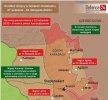
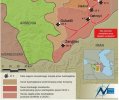
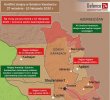
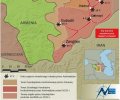
It is worth emphasizing that Armenian-Russian relations are much more complex than is often presented. When the South Caucasus, including what is now Armenia, was conquered by Russia as a result of wars with Persia in the early In the nineteenth century, the Russians not only did not give the Armenians any autonomy, but even did not create a uniform administrative unit encompassing the Armenian lands, and later began the Russification of the Armenians. Anti-Russian sentiment in Armenia began to rise again after it turned out during the Four-Day War in 2016 that Azerbaijan was attacking Armenians with weapons supplied to it by Russia. Less than two months after the end of these clashes, a monument to General Geregin Nżdeh, the Armenian hero of the fight against the Soviets, was erected in the capital of Armenia. When in 2018 the pro-Russian Karabakh clan was removed from power by Nikol Pashinyan, the latter tried to maneuver between Moscow and the West.
However, when in July 2020 Russia did not react to Azerbaijan's attack on the Armenian Tavush, voices began to appear in Armenia calling for the liquidation of Russian bases in Armenia if Russia did not defend Armenia and Arcach against Azerbaijan attacks. Meanwhile, the 44-day war was considered by many Armenians as a conspiracy by Moscow and Baku against Armenia, and after the signing of the ceasefire on November 9, anti-Russian sentiment was very clear among the protesters outside the parliament in Yerevan. Only later did the pro-Russian opposition with former presidents Robert Kocharyan and Serzh Sarkisian mobilize, but these forces lost the parliamentary elections in June 2021 (around 30% of the vote). Unambiguously anti-Russian and pro-Western parties received around 15% of the vote, but due to fragmentation, they did not win any seat. On the other hand, Pashinyan's list won almost 54% of the votes.
Another attack by Azerbaijan, this time carried out on the territory of Armenia (and not Arcach), which took place in September 2022, triggered another escalation of anti-Russian sentiment. This was due to the ODKB's avoidance of, resulting from Art. 4 of the Treaty, the obligation to provide armed assistance to Armenia, as it has demanded. This situation showed that the security guarantees on the part of the ODKB are completely fictional. The war in Ukraine weakened Russia and limited the possibilities of managing the situation in the post-Soviet area of the South Caucasus and Central Asia. In addition, two other members of the ODKB, Kazakhstan and Kyrgyzstan, are members of the Organization of Turkish States, along with Azerbaijan and Turkey, and Kazakhstan's president, Kasym-Żomart, Tokayev explicitly stated that he would not take any action against Azerbaijan. The close personal relations between Lukashenka and Aliyev are also well known.
The official pretext for not helping Armenia from the ODKB was the "unregulated" nature of the Azerbaijani-Armenian border, which, moreover, made the Armenians even more agitated. over Sjunik, i.e. the strategic province connecting Armenia with Iran, and separating Turkey and Nakhichevan from Azerbaijan (and further through the Caspian Sea - largely Turkic, and at the same time post-Soviet, central Asia). the border, occupying fragments of the road connecting Yerevan with Iran, and damaged the bypass built by Armenia in September 2022. In view of this attitude of Russia and the ODKB, Armenia is forced to look for other safeguards for its territorial integrity, which can only be achieved by relying on Iran or the West.
Iran seems determined to prevent the loss of the border with Armenia, which results not only from the country's historical ties with Armenia, but also from Iran's internal issues (possible territorial claims of Turko-Azerbaijan to the provinces of Western and Eastern Azerbaijan in Iran). Nevertheless, Iran does not have a strong position in global politics, and thus, it is not a sure guarantor of Armenia's security. In the course of the confrontation in September 2022, Iran, moreover, retained considerable restraint. The alternative is therefore the West, with which Armenians have much more in common in the civilization and political dimension. This is due to, inter alia, from a significant and influential Armenian diaspora, especially in countries such as the USA and France, and from the fact that Armenia, next to Georgia, is the only democracy in this part of the world, surrounded by authoritarian or even totalitarian regimes. This is very important, considering the Biden's doctrine of opposing the democratic world to dictatorships led by Russia and China.
Both the US and Europe strive to stabilize the South Caucasus, because on the one hand, the values on which the West is built dictate support for Armenia (which also translates into public opinion), while interests related to energy resources determine the agreements with Azerbaijan.
Moreover, the fact that Turkey is a NATO member plays a significant role. The stabilization of the South Caucasus would lead to Russia losing its influence there, and therefore would have a positive effect on the security of transit. The problem is that Donald Trump's attitude towards the 44-day war of 2020 allowed Russia to teach Armenia a "lesson" in the form of a message that it could not count on the support of the West (President Macron declared support for Armenia but it did not take any In the event of Yerevan's disloyalty, Moscow may initiate further Azerbaijan attacks on Armenia, generating further losses on its part.However, Biden's assumption of the presidency changed the situation, as evidenced by Nancy Pelosi's visit to Yerevan after the clashes in September 2020. Macron, who traditionally wants to compete with them, which resulted in talks in Prague, also mobilized this action by the Americans. Armenia was undertaken in 2008-2009 (the so-called football diplomacy), but it ended in a fiasco because Erdogan made it dependent on the Arcach issue.
The weakening of Russia's position after the invasion of Ukraine led to Armenia's greater assertiveness, which translated into the country's attitude in the international arena (including the lack of support for Russia in all UN votes, despite the awareness of the possible consequences in the form of a "criminal" attack by Azerbaijan , and recently a refusal to participate in ODKB exercises.) Pashinyan, however, was aware that he was treading on thin ice, but during the Azerbaijan attack in September, he stressed in the parliament that “we want to sign a document for which (...) we will be called traitors ( ...) people may even remove us from power (...) but thanks to this Armenia will gain lasting peace and security in the area of 29,800 square kilometers (i.e. the internationally recognized territory of Armenia) ". This was interpreted as a readiness to recognize Azerbaijan's unconditional sovereignty over Arcach in exchange for the delimitation of the border, and thus Azerbaijan's withdrawal from border provocations and securing Armenian sovereignty over Sjunik. .
The normalization of Armenia's relations with Azerbaijan and Turkey, apart from the obvious economic benefits, would enable Armenia to leave the ODKB and other integration structures built by Russia, including the Commonwealth of Independent States, and turn towards the EU and NATO, with the prospect of membership in both organizations (although today it seems it becomes unrealistic, standardization in the South Caucasus would open up the possibility of a new geopolitical system). A possible resumption of the conflict would have a completely different character, as it would refer to Sujnik, over which Armenia's sovereignty does not raise any doubts.
The problem is that Russia, although weakened, certainly will not give up easily. Pashinyan's agreement with Erdogan and Aliyev will be used by the pro-Russian opposition and Russified Armenians living in Russia (such as Margarita Simonjan) to declare Pashinyan a traitor and, as a result, attempt to overthrow him. Much will depend on whether Russia will risk withdrawing from Arcach and handing over control of it to Azerbaijan, hoping that the Armenians forced to leave Arcach will turn against Pashinyan. It is not obvious, however, as a large part of them may blame Russia, thus contributing to its eventual defeat in the South Caucasus. In this context, it is worth pointing to the sudden relocation of Ruben Vardanjan, an Armenian oligarch of Armenian origin, to Arcach. Its task may be not only to strengthen Russia's influence in Arcach and to channel dislike for Pashinyan and Armenians from Armenia in general (Russian propaganda calculated to divide the Armenians from Armenia and Arcach became very strong after the 44-day war) but also to cause riots in Armenia in to overthrow Pashinyan (under the pretext of treason against Arcach).
However, this is not the end of Armenia's problems with a potential agreement with Azerbaijan and Turkey. Another problem is that of the extraterritorial corridor leading through Sjunik from Azerbaijan to Nakhichevan and Turkey, the creation of which is requested by both Baku and Ankara, and which Armenia does not want to agree to for obvious reasons. It is this point that is the biggest problem in reaching an agreement. It is worth adding that the creation of such a corridor would also be beneficial for Russia, as it would be conflicting, and it would also be a transport alternative for Russia to Turkey (compared to the route leading through Vladikavkaz and Tbilisi to Erzurum).
In this context, it is of key importance for Armenia what security guarantees it can count on from the US. Macron is a much less reliable partner, considering that his pro-Armenia attitude in 2020 practically did not result in anything. Nancy Pelosi's visit to Yerevan was therefore of fundamental importance. However, it is not certain what exactly accompanied its findings.
Turkey and Azerbaijan have much less need to conclude an agreement with Armenia, which means that their position is inflexible and their demands are maximalistic. For Aliyev, gaining full control of Arcach would be a historic success and would strengthen his dictatorial power.But the condition would have to be the withdrawal of the Russian troops, and this, as I indicated above, is not at all obvious. The maintenance of the Russian troops could possibly be covered by the revision of the border, advantageous for Azerbaijan (in order to absorb the enclaves) and the creation of an extraterritorial corridor to Nakhichevan, i.e. the conditions that hit Armenia's interests the most. Given the nature of the relations between Turkey and Azerbaijan on the one hand, and Russia on the other, it cannot be ruled out that the negotiations with Armenia are just a bluff, which is supposed to be an element of pressure from Baku and Ankara on Moscow (regarding other concessions). However, for Turkey, as for Azerbaijan, the key benefit would be an extraterritorial corridor. A secondary benefit would be that Erdogan could boast of success in foreign policy ahead of the elections scheduled for next year.
En ole tosiaan seurannut tämän seudun tapahtumia sitten vuoden 2008 Georgian ja Venäjän sodan jälkeen, toisinaan ehkä vähän kun on kuulunut Iranin pakotteiden löysäämisestä sekä erilaisista mielenosoituksista jne.
Hyvin monimutkainen seutu tosiaan: Turkin ja Azerbaijanin hyvin läheiset välit, Georgian läpi kulkevat putket jotka kiertävät Armenian, Armenia kristittynä kansana näiden muslimimaiden puristuksessa, Armenian sisällä selvästi agressiivisempia ryhmiä jotka haluavat revanssia ja menetettyjen alueiden takaisin valtaamista, toisaalta Armenian sisällä myös niitä jotka haluaisivat vain välttyä sodalta ja lisätä kanssakäymistä Lännen kanssa, monet Armeniassa pettyneitä Venäjän toimiin mm. 2020 sodan aikana ja sen jälkeen, Iran puolestaan ei halua menettää maayhteyttä Armenian ja Georgian kautta Venäjälle (jos siis Azerbaijan valtaisi sen), toisaalta Azerbaijanilla on se "itsehallintoalue" Armenian ja Turkin välissä eli ehkä halua "yhdistää maa", Venäjällä puolestaan selvästi intressit pitää sormensa pelissä myös tällä alueelle vaikka ovatkin selvästi heikentyneet.
Tuokaan ei ole mikään kattava lista vaan sellainen jonka kynäilin nopeasti ulkomuistista. Turkilla on haaveita suuremmasta "turkkilaisen kansojen" yhteistyöstä ja öljy- sekä kaasuputket ovat avain tähän. Kuulee ristiriitaisia puheita miten muut kansat suhtautuvat tähän: osa puhuu että "azerit ovat turkkilaisia" ja osa ei ole ihan näin "läheisissä tunnelmissa". Ymmärtääkseni Kazakstan varsinkin ei ole kovin halukas tällaiseen "naimakauppaan" vaan pitävät itseään "sukulaiskansana" mutta silti itsenäisenä.
Alueella on myös suuri määrä erilaisia heimoja ja tietysti nämä asuttavat seutuja rajoista piittaamatta, minkä takia esim. kurdeja löytyy monen maan alueelta. Näillä voi olla vaihtelevassa määrin halua osallistua mahdollisiin konflikteihin, tosin todennäköisemmin jäisivät taistelujen jalkoihin jos jotain suurempaa alkaisi.
Eikä sovi tosiaan unohtaa Iranin pidempään jatkuneita sisäisiä levottomuuksia. Tulee helposti mieleen että heillä on painetta ulkoiselle viholliselle, jotta saadaan "perusteet" myös kovempiin otteisiin maan sisällä. Toisaalta voi olla että tällä kertaa ulkoinen uhka on todellinen, ehkä Azerbaijan ei ole pitkään tyytyväinen solmittuun rauhaan ja pyrkii seuraavaksi saamaan palasen lisää Armeniasta? Nyt kun maailman huomio on ensisijaisesti Ukrainassa niin olisi oiva tilaisuus kokeilla, Venäjän heikkous huomioituna - toki Venäjä ei estänyt vuoden 2020 sotaa joten tuskin sillä olisi suuresti vaikutusta nytkään. Heillä on hyvin rajalliset keinot tehdä mitään tällä seudulla, ei ole läheskään samassa määrin resursseja kuin mitä esim. Kaukasuksen alueella tai Ukrainan ympärillä.
Armenia will pay a high price for independence from Russia [OPINION]
Armenia will pay a high price for independence from Russia [OPINION]
WRWITOLD REPETOWICZ10/12/2022 16:11
The talks between the leaders of Armenia, Azerbaijan and Turkey in the sidelines of the Prague summit of the European Political Community increase the likelihood of the settlement of relations between the three countries. Theoretically, Armenia could free itself from Russian ticks, but the price that Pashinyan will have to pay may lead to a pro-Russian coup. So it all depends on US support.
The photos from the Prague summit show a clear contrast between the cheerful Turkish president Recep Tayyip Erdogan and the president of Azerbaijan Ilham Aliyev, and the gloomy Prime Minister of Armenia Nikol Pashinyan. No wonder, because the task facing the Armenian leader is squaring the circle. On the one hand, it is in Armenia's interest to dismantle Russia's security blackmail, which would allow it to turn to the West. On the other hand, the recognition by Pashinyan of Azerbaijan's sovereignty over Arcach (Nagorno-Karabakh) would lead to a boil in Armenia and, consequently, a pro-Russian coup could not be ruled out. It could also mean the elimination of all traces of Armenianness in Arcach, which would undoubtedly be a historical injustice.
However, the consequences of a possible Armenian-Azerbaijani-Turkish normalization with regard to Arcach are not obvious. A key (though not the only) element of this normalization would be mutual recognition by Armenia and Azerbaijan, probably the establishment of diplomatic relations, and above all the recognition of territorial integrity, border delimitation and the opening of border crossings (including with Turkey). Another aspect is the creation of a connection between Azerbaijan and Nakhichevan and Turkey, which I will write about later.Mutual recognition of territorial integrity refers not only to the sovereignty of Azerbaijan over Arcach, but also to the dissolution of several smaller ethno-administrative enclaves (4 Azerbaijani, i.e. Karki, Sofulu, Yukhari Askipara and Barxudarli in Armenia, and 1 Armenian, i.e. Artsvashen in Azerbaijan) Soviet in the classical complication of the administrative division.During the first stage of the war, i.e. at the beginning of in the 1990s, they were de facto annexed by Armenia and Azerbaijan, respectively, but without any international legal consequences. It is hard to expect their restitution in the form of enclaves, but they may constitute the basis for border revision and it is unlikely that it will be done in a way favorable to Armenia.
ALSO READ
The Arcach case is of a completely different nature and it is worth remembering that Armenia does not formally recognize its independence, so recognizing Azerbaijan's territorial integrity would not mean withdrawing such recognition (because it never happened). Of course, the facts are different, and that means that Armenia would have to give up any administrative, political or military support for Arcach. So what would happen to him? The actual regaining of Azerbaijan sovereignty over this territory would mean an exodus of around 100,000. its inhabitants, coupled with the massive destruction of abandoned houses, buildings and infrastructure, which the authorities in Yerevan will not be able to prevent, even if they commit to it. Since Azerbaijan is not a democratic state, but an authoritarian dictatorship in which human rights are violated on a mass scale, any security guarantees for Armenians who choose to stay in the territories under Azerbaijan administration would be unreliable. It would also be expected that all traces of Armenian identity in these areas would be completely obliterated in a fairly short time (as happened in all other territories under Azerbaijan's administration). It is worth adding that for the first time in history, Arcach would come under the sovereignty of Azerbaijan (both the Azerbaijan SSR and the Karabakh Khanate existing in 1748-1822 were not sovereign entities).The problem is that after the 44-day war, Armenia largely lost control of Arcach to Russia, which had brought its forces there. Thus, the recognition of Azerbaijan's territorial integrity by Armenia would not mean that Arcach was automatically seized by Azerbaijan, but would shift the dispute over this territory from the Yerevan-Baku line to the Moscow-Baku line. If Russia wanted to maintain its control over this area, gained in 2020, it would have to stop Azerbaijan itself, and this would put it in a very embarrassing situation. This would be all the more important for Moscow, because the delimitation of the border between Azerbaijan and Armenia would open the way for Armenia to leave the Collective Security Agreement Organization (ODKB) and liquidate the Russian military presence in its territory. Thus, Arcach in such a system would remain for Russia the last stronghold in the entire South Caucasus.




It is worth emphasizing that Armenian-Russian relations are much more complex than is often presented. When the South Caucasus, including what is now Armenia, was conquered by Russia as a result of wars with Persia in the early In the nineteenth century, the Russians not only did not give the Armenians any autonomy, but even did not create a uniform administrative unit encompassing the Armenian lands, and later began the Russification of the Armenians. Anti-Russian sentiment in Armenia began to rise again after it turned out during the Four-Day War in 2016 that Azerbaijan was attacking Armenians with weapons supplied to it by Russia. Less than two months after the end of these clashes, a monument to General Geregin Nżdeh, the Armenian hero of the fight against the Soviets, was erected in the capital of Armenia. When in 2018 the pro-Russian Karabakh clan was removed from power by Nikol Pashinyan, the latter tried to maneuver between Moscow and the West.
However, when in July 2020 Russia did not react to Azerbaijan's attack on the Armenian Tavush, voices began to appear in Armenia calling for the liquidation of Russian bases in Armenia if Russia did not defend Armenia and Arcach against Azerbaijan attacks. Meanwhile, the 44-day war was considered by many Armenians as a conspiracy by Moscow and Baku against Armenia, and after the signing of the ceasefire on November 9, anti-Russian sentiment was very clear among the protesters outside the parliament in Yerevan. Only later did the pro-Russian opposition with former presidents Robert Kocharyan and Serzh Sarkisian mobilize, but these forces lost the parliamentary elections in June 2021 (around 30% of the vote). Unambiguously anti-Russian and pro-Western parties received around 15% of the vote, but due to fragmentation, they did not win any seat. On the other hand, Pashinyan's list won almost 54% of the votes.
ALSO READ
Another attack by Azerbaijan, this time carried out on the territory of Armenia (and not Arcach), which took place in September 2022, triggered another escalation of anti-Russian sentiment. This was due to the ODKB's avoidance of, resulting from Art. 4 of the Treaty, the obligation to provide armed assistance to Armenia, as it has demanded. This situation showed that the security guarantees on the part of the ODKB are completely fictional. The war in Ukraine weakened Russia and limited the possibilities of managing the situation in the post-Soviet area of the South Caucasus and Central Asia. In addition, two other members of the ODKB, Kazakhstan and Kyrgyzstan, are members of the Organization of Turkish States, along with Azerbaijan and Turkey, and Kazakhstan's president, Kasym-Żomart, Tokayev explicitly stated that he would not take any action against Azerbaijan. The close personal relations between Lukashenka and Aliyev are also well known.
The official pretext for not helping Armenia from the ODKB was the "unregulated" nature of the Azerbaijani-Armenian border, which, moreover, made the Armenians even more agitated. over Sjunik, i.e. the strategic province connecting Armenia with Iran, and separating Turkey and Nakhichevan from Azerbaijan (and further through the Caspian Sea - largely Turkic, and at the same time post-Soviet, central Asia). the border, occupying fragments of the road connecting Yerevan with Iran, and damaged the bypass built by Armenia in September 2022. In view of this attitude of Russia and the ODKB, Armenia is forced to look for other safeguards for its territorial integrity, which can only be achieved by relying on Iran or the West.
ALSO READ
Iran seems determined to prevent the loss of the border with Armenia, which results not only from the country's historical ties with Armenia, but also from Iran's internal issues (possible territorial claims of Turko-Azerbaijan to the provinces of Western and Eastern Azerbaijan in Iran). Nevertheless, Iran does not have a strong position in global politics, and thus, it is not a sure guarantor of Armenia's security. In the course of the confrontation in September 2022, Iran, moreover, retained considerable restraint. The alternative is therefore the West, with which Armenians have much more in common in the civilization and political dimension. This is due to, inter alia, from a significant and influential Armenian diaspora, especially in countries such as the USA and France, and from the fact that Armenia, next to Georgia, is the only democracy in this part of the world, surrounded by authoritarian or even totalitarian regimes. This is very important, considering the Biden's doctrine of opposing the democratic world to dictatorships led by Russia and China.
Both the US and Europe strive to stabilize the South Caucasus, because on the one hand, the values on which the West is built dictate support for Armenia (which also translates into public opinion), while interests related to energy resources determine the agreements with Azerbaijan.
Moreover, the fact that Turkey is a NATO member plays a significant role. The stabilization of the South Caucasus would lead to Russia losing its influence there, and therefore would have a positive effect on the security of transit. The problem is that Donald Trump's attitude towards the 44-day war of 2020 allowed Russia to teach Armenia a "lesson" in the form of a message that it could not count on the support of the West (President Macron declared support for Armenia but it did not take any In the event of Yerevan's disloyalty, Moscow may initiate further Azerbaijan attacks on Armenia, generating further losses on its part.However, Biden's assumption of the presidency changed the situation, as evidenced by Nancy Pelosi's visit to Yerevan after the clashes in September 2020. Macron, who traditionally wants to compete with them, which resulted in talks in Prague, also mobilized this action by the Americans. Armenia was undertaken in 2008-2009 (the so-called football diplomacy), but it ended in a fiasco because Erdogan made it dependent on the Arcach issue.
The weakening of Russia's position after the invasion of Ukraine led to Armenia's greater assertiveness, which translated into the country's attitude in the international arena (including the lack of support for Russia in all UN votes, despite the awareness of the possible consequences in the form of a "criminal" attack by Azerbaijan , and recently a refusal to participate in ODKB exercises.) Pashinyan, however, was aware that he was treading on thin ice, but during the Azerbaijan attack in September, he stressed in the parliament that “we want to sign a document for which (...) we will be called traitors ( ...) people may even remove us from power (...) but thanks to this Armenia will gain lasting peace and security in the area of 29,800 square kilometers (i.e. the internationally recognized territory of Armenia) ". This was interpreted as a readiness to recognize Azerbaijan's unconditional sovereignty over Arcach in exchange for the delimitation of the border, and thus Azerbaijan's withdrawal from border provocations and securing Armenian sovereignty over Sjunik. .
The normalization of Armenia's relations with Azerbaijan and Turkey, apart from the obvious economic benefits, would enable Armenia to leave the ODKB and other integration structures built by Russia, including the Commonwealth of Independent States, and turn towards the EU and NATO, with the prospect of membership in both organizations (although today it seems it becomes unrealistic, standardization in the South Caucasus would open up the possibility of a new geopolitical system). A possible resumption of the conflict would have a completely different character, as it would refer to Sujnik, over which Armenia's sovereignty does not raise any doubts.
The problem is that Russia, although weakened, certainly will not give up easily. Pashinyan's agreement with Erdogan and Aliyev will be used by the pro-Russian opposition and Russified Armenians living in Russia (such as Margarita Simonjan) to declare Pashinyan a traitor and, as a result, attempt to overthrow him. Much will depend on whether Russia will risk withdrawing from Arcach and handing over control of it to Azerbaijan, hoping that the Armenians forced to leave Arcach will turn against Pashinyan. It is not obvious, however, as a large part of them may blame Russia, thus contributing to its eventual defeat in the South Caucasus. In this context, it is worth pointing to the sudden relocation of Ruben Vardanjan, an Armenian oligarch of Armenian origin, to Arcach. Its task may be not only to strengthen Russia's influence in Arcach and to channel dislike for Pashinyan and Armenians from Armenia in general (Russian propaganda calculated to divide the Armenians from Armenia and Arcach became very strong after the 44-day war) but also to cause riots in Armenia in to overthrow Pashinyan (under the pretext of treason against Arcach).
However, this is not the end of Armenia's problems with a potential agreement with Azerbaijan and Turkey. Another problem is that of the extraterritorial corridor leading through Sjunik from Azerbaijan to Nakhichevan and Turkey, the creation of which is requested by both Baku and Ankara, and which Armenia does not want to agree to for obvious reasons. It is this point that is the biggest problem in reaching an agreement. It is worth adding that the creation of such a corridor would also be beneficial for Russia, as it would be conflicting, and it would also be a transport alternative for Russia to Turkey (compared to the route leading through Vladikavkaz and Tbilisi to Erzurum).
In this context, it is of key importance for Armenia what security guarantees it can count on from the US. Macron is a much less reliable partner, considering that his pro-Armenia attitude in 2020 practically did not result in anything. Nancy Pelosi's visit to Yerevan was therefore of fundamental importance. However, it is not certain what exactly accompanied its findings.
Turkey and Azerbaijan have much less need to conclude an agreement with Armenia, which means that their position is inflexible and their demands are maximalistic. For Aliyev, gaining full control of Arcach would be a historic success and would strengthen his dictatorial power.But the condition would have to be the withdrawal of the Russian troops, and this, as I indicated above, is not at all obvious. The maintenance of the Russian troops could possibly be covered by the revision of the border, advantageous for Azerbaijan (in order to absorb the enclaves) and the creation of an extraterritorial corridor to Nakhichevan, i.e. the conditions that hit Armenia's interests the most. Given the nature of the relations between Turkey and Azerbaijan on the one hand, and Russia on the other, it cannot be ruled out that the negotiations with Armenia are just a bluff, which is supposed to be an element of pressure from Baku and Ankara on Moscow (regarding other concessions). However, for Turkey, as for Azerbaijan, the key benefit would be an extraterritorial corridor. A secondary benefit would be that Erdogan could boast of success in foreign policy ahead of the elections scheduled for next year.
En ole tosiaan seurannut tämän seudun tapahtumia sitten vuoden 2008 Georgian ja Venäjän sodan jälkeen, toisinaan ehkä vähän kun on kuulunut Iranin pakotteiden löysäämisestä sekä erilaisista mielenosoituksista jne.
Hyvin monimutkainen seutu tosiaan: Turkin ja Azerbaijanin hyvin läheiset välit, Georgian läpi kulkevat putket jotka kiertävät Armenian, Armenia kristittynä kansana näiden muslimimaiden puristuksessa, Armenian sisällä selvästi agressiivisempia ryhmiä jotka haluavat revanssia ja menetettyjen alueiden takaisin valtaamista, toisaalta Armenian sisällä myös niitä jotka haluaisivat vain välttyä sodalta ja lisätä kanssakäymistä Lännen kanssa, monet Armeniassa pettyneitä Venäjän toimiin mm. 2020 sodan aikana ja sen jälkeen, Iran puolestaan ei halua menettää maayhteyttä Armenian ja Georgian kautta Venäjälle (jos siis Azerbaijan valtaisi sen), toisaalta Azerbaijanilla on se "itsehallintoalue" Armenian ja Turkin välissä eli ehkä halua "yhdistää maa", Venäjällä puolestaan selvästi intressit pitää sormensa pelissä myös tällä alueelle vaikka ovatkin selvästi heikentyneet.
Tuokaan ei ole mikään kattava lista vaan sellainen jonka kynäilin nopeasti ulkomuistista. Turkilla on haaveita suuremmasta "turkkilaisen kansojen" yhteistyöstä ja öljy- sekä kaasuputket ovat avain tähän. Kuulee ristiriitaisia puheita miten muut kansat suhtautuvat tähän: osa puhuu että "azerit ovat turkkilaisia" ja osa ei ole ihan näin "läheisissä tunnelmissa". Ymmärtääkseni Kazakstan varsinkin ei ole kovin halukas tällaiseen "naimakauppaan" vaan pitävät itseään "sukulaiskansana" mutta silti itsenäisenä.
Alueella on myös suuri määrä erilaisia heimoja ja tietysti nämä asuttavat seutuja rajoista piittaamatta, minkä takia esim. kurdeja löytyy monen maan alueelta. Näillä voi olla vaihtelevassa määrin halua osallistua mahdollisiin konflikteihin, tosin todennäköisemmin jäisivät taistelujen jalkoihin jos jotain suurempaa alkaisi.
Eikä sovi tosiaan unohtaa Iranin pidempään jatkuneita sisäisiä levottomuuksia. Tulee helposti mieleen että heillä on painetta ulkoiselle viholliselle, jotta saadaan "perusteet" myös kovempiin otteisiin maan sisällä. Toisaalta voi olla että tällä kertaa ulkoinen uhka on todellinen, ehkä Azerbaijan ei ole pitkään tyytyväinen solmittuun rauhaan ja pyrkii seuraavaksi saamaan palasen lisää Armeniasta? Nyt kun maailman huomio on ensisijaisesti Ukrainassa niin olisi oiva tilaisuus kokeilla, Venäjän heikkous huomioituna - toki Venäjä ei estänyt vuoden 2020 sotaa joten tuskin sillä olisi suuresti vaikutusta nytkään. Heillä on hyvin rajalliset keinot tehdä mitään tällä seudulla, ei ole läheskään samassa määrin resursseja kuin mitä esim. Kaukasuksen alueella tai Ukrainan ympärillä.
Bellingcat on tutkinut hiljattaista vankien teloitusta:
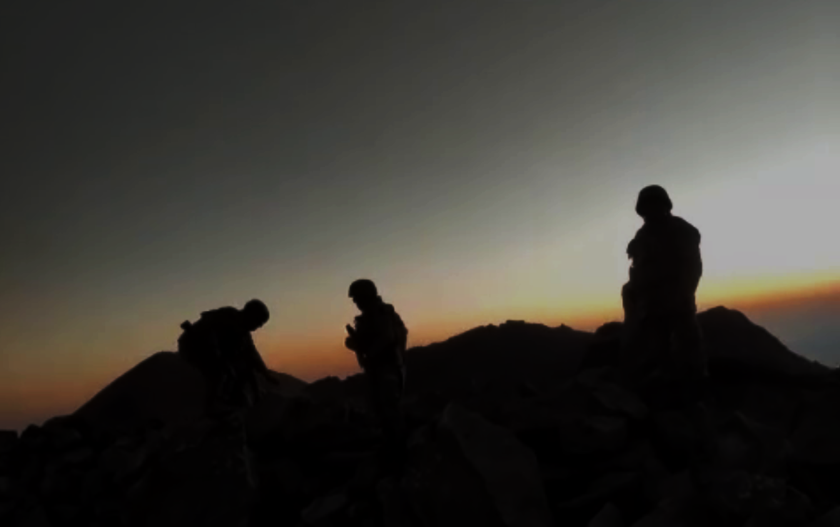
 www.bellingcat.com
www.bellingcat.com

An Execution Near Sev Lake - bellingcat
A video which surfaced online in early October appears to show Azerbaijani soldiers executing a group of prisoners. Here's how we verified the location and timeframe.

